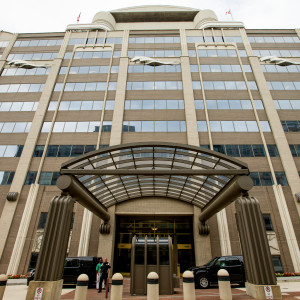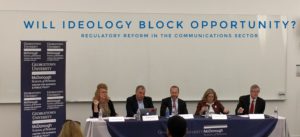With the ongoing merger reviews of AT&T and Time Warner or Sinclair Broadcast Group and Tribune Media, the Federal Communications Commission has been a prime player in some of the biggest mergers of the past year. When evaluating mergers and other activities of telecommunications companies, the FCC is granted the authority to act broadly in the “public interest.” But what exactly does this mean and is the commission enforcing regulations in a fair and efficient manner?
Current FCC Chairman Ajit Pai has himself in the past been a critic of the unrestricted nature of the FCC’s approval process, as well as its inefficiencies and potential for abuse. Let’s consider some of the problems.
Former FCC Commissioner Kathleen Abernathy said that many FCC actions during the merger review process are an “abuse of power” that often cause telecom companies to “throw money down the rat hole before they even own anything.”
“I think a black hole where appointed officials through the merger authority start imposing obligations that have nothing to do with the statute on companies just because they can, I think that’s wrong. I think it’s an abuse of power and it shows a lack of regulatory humility, which isn’t a good thing to have,” Abernathy said Wednesday during a discussion on regulatory reform in the communications sector. The discussion was titled “Will Ideology Block Opportunity? Regulatory Reform in the Communications Sector,” and was organized by the Georgetown Center for Business and Public Policy.
Congress directed the FCC under the Communications Act in 1934 to review transactions involving licenses and authorizations in the telecom industry and to determine whether proposed transaction would serve “the public interest, convenience, and necessity.”
“The FCC has such a broad grant of authority, it’s about as broad a grant of authority as I’ve ever seen,” Abernathy said.
Former FCC General Counsel Sam Feder, who was also a panelist at the discussion, which took place at Georgetown University, made the argument that the Department of Justice and the Federal Trade Commission already perform reviews of proposed transactions under the antitrust laws and so having the FCC oftentimes duplicate this work doesn’t make sense, he said.
If the DOJ and FTC allow a transaction to move forward, there should be a strong presumption that the transaction is in the public interest, Feder argued.
Due to overlapping regulatory jurisdiction between the FCC and state public utility commissions (PUCs) that evaluate proposed transactions within the telecom industry, companies undergoing a transaction must usually get approval from the DOJ or FTC and the FCC as well as from PUCs in states related to the transaction.
Feder wrote a paper earlier this month that outlined his proposals and suggestions on how to streamline the federal and state regulatory review of transactions in the communications industry. Feder now represents telecom companies as a lawyer at Jenner & Block, and Verizon sponsored his paper.
In his proposal, Feder says that typically during a transaction review period, state PUCs make “excessive demands as conditions of their approval and attempt to duplicate the competitive analysis conducted by the DOJ/FTC.” These demands ultimately increase costs and detract from efficiencies and public benefits that could otherwise be realized from transactions in the telecom space, Feder argues.
As an example, “the of City of Eugene, Oregon put a tax on broadband companies, 7% of broadband revenue… I’ve been told by my clients (telecom companies) that the tax essentially adds $3 on to every bill,” Feder said.
The traditional role and recognized interests of the FCC and state PUCs is in “preserving and advancing universal service, protecting the public safety, ensuring the quality of telecommunications services, and safeguarding the rights of consumers,” Feder says. He argues that in many cases these entities are overstepping their bounds today and, furthermore, companies lack any path for recourse.
“Judicial review of agency decisions to deny approval of a particular transaction (or to grant such approval only in exchange for conditions) is in many cases effectively unavailable in practice because of the ability of the agencies to delay court proceedings (for a year or longer) past when a transaction is scheduled to close,” Feder said in his proposal.
John Mayo, a professor at Georgetown who specializes in the economics of antitrust and regulation, said during the discussion that “it’s hard to self discipline the FCC and its broad interpretation of ‘public interest’ – which could include building swimming pools in the states where a review process is occurring.”
Furthermore he argued that the FCC’s “current regulatory framework causes upward pressure on prices in the telecom industry or at the least causes prices to decrease slower than they would otherwise.”


